You may also enjoy these helpful language aids. 
 Audio files for all of the Chinese Phrase A Day entries are available online. Listening and repeating after the native speakers will help you to polish your Chinese. Visit www.tuttlepublishing.com for the audio files.
Audio files for all of the Chinese Phrase A Day entries are available online. Listening and repeating after the native speakers will help you to polish your Chinese. Visit www.tuttlepublishing.com for the audio files.
About the Authors Sam Brier has lived, worked and studied throughout Asia for more than 10 years. He taught English in Osaka, Japan, and at Sichuan International Studies University (SISU) in Chongqing, China.
Sam is the founder and director of Academic Experiences Abroad (AEA), a company that develops customized faculty-led programs and provides logistics for university initiatives to Asia ( www.AEA-Asia.com ). Sam and his wife, Linh, spend most of their time between the U.S., China and Vietnam working on study abroad initiatives between the U.S. and Asia. The authors proceeds from this calendar will go toward educational scholarships in the U.S. and Asia. 2 High School) in Anhui province, about 7 hours west of Shanghai by train. 2 High School) in Anhui province, about 7 hours west of Shanghai by train.
She has been teaching English in China since college. From 2007 to 2008, she taught Chinese in Houston, Texas, with American Field Services (AFS) at St. Stevens High School. Sam, a volunteer with AFS, hosted Xia when she arrived and they became good friends.
SMALL TALK Days 131

! Xnnin kuil! Happy New Year! CULTURAL NOTE In order to read a newspaper, a person needs to know about 5,000 Chinese characters; 3,000 will do for functional literacythat is, to be able to read signs, buy food and the like. ? N ho ma? How are you? ? Hn ho. ? N ho ma? How are you? ? Hn ho.
N ne? Very good. And you? CULTURAL NOTE A dish of carrot made hastily may contain dirt. Chinese proverb Xexie. Thank you. B yng xie. Youre welcome.
CULTURAL NOTE China has over 100 cities with more than one million people. Beijing and Shanghai each have a population of around 12 to 15 million. ? N jio shnme mngzi? Whats your name? __________ W jio __________ . My name is __________. __________ CULTURAL NOTE Arabic script (or Uiger) is one of the 4 scripts used on Chinese currency. ? N sh n gu rn? What nationality are you? ? W sh Migu rn. ? N sh n gu rn? What nationality are you? ? W sh Migu rn.
N ne? Im American. And you? CULTURAL NOTE There are five time zones in China, but only Beijing time is used across the entire country. ? N sh Migu rn ma? Are you American? , Sh de, w sh Migu rn. Yes, Im American. CULTURAL NOTE Drinking with a dear friend, a thousand shots are too few; talking with a disagreeable person, half a sentence is too many. Chinese proverb ? N loji nr de? Whats your hometown? W loji zi Niyu.
My hometown is New York. CULTURAL NOTE There are about 50 Starbucks in Beijing and Shanghaieach. There are more than 1,000 KFCs in China and McDonalds is not far behind. Nor is 7-11, the convenience store. ? N jihn le ma? Are you married? , / Sh de, w jihn le. / Hi miyu.
Yes, Im already married. / Not yet. / CULTURAL NOTE A Russo-Chinese border treaty signed at Nerchinsk in 1689 was the first treaty concluded between China and a European power. It fixed the Sino-Russian border to the north of the Amur river, and also permitted Russian trading caravans to go to Beijing. ? N yu hizi ma? Do you have any children? / Yu. Yes. [lit. [lit.
I have.] / No. [lit. I dont have.] / LANGUAGE NOTE Ma is a question article that is added to sentences to form a question. If the sentence above was N yu hizi, that would mean You have a child. Note, however, that ma is not used in question sentences that have a question word, for example what , where , why . / Miyu. Yes. [lit. [lit.
I have.] / No. [lit. I dont have.] / LANGUAGE NOTE Yu means have and miyu means no have. Since the subject is understood to be I, it is left out. Sometimes you will hear people answer Hi miyu : I dont have one, yet . / ? T jio shnme mngzi? What is his / her name? / / ______________ T jio ______________ .
His / Her name is ______________. / ______________ LANGUAGE NOTE Notice that t means both he and she. It is just the written character that differs; the spoken word is the same. Jio means call, so literally the question is: He/She (is) called what name? In this case, mngzi means your first name or your first and last name. In China, people usually go by their last name first, but many people also have English names which they might tell you. / T zi nr? Where is he / she? / / T zi Bijng.
He / She is in Beijing. / LANGUAGE NOTE Zi means in or at, so the question is He/She (is) at where? Remember, in Chinese, if a question word is used in the sentence (in this case, where) then the question article ma is not used. ? N xhuan Bijng ma? Do you like Beijing? W fichng xhuan Bijng. I like Beijing very much. CULTURAL NOTE Bi means North, and Jng means capital. Together, Bijng means the Northern Capital .
Likewise, Nn means South , so the city of Nnjng means Southern Capital , which it was for a long time. ? N q guo Shnghi ma? Have you been to Shanghai? , / Sh de, q guo. / Mi q guo. Yes, I have been. / I havent been. / LANGUAGE NOTE N means you.
Nn ( ) is a polite form. If you add men to these words, such as Nmen or Nnmen , the you becomes plural, as in You all. / ? N sh Migu / Jind rn ma? Are you American / Canadian? / CULTURAL NOTE The spoken languages of the Peoples Republic of China belong to at least seven main groups (and the dialects run in the hundreds if not thousands). Since the early 20 th century the Standard Mandarin dialect has been promoted as the official language of China. W pngyou y sh Shnghi rn. My friend is also from Shanghai.
CULTURAL NOTE If the lips are gone, the teeth will grow cold. Chinese proverb ? N yu xingdjimi ma? Do you have any siblings? Miyu. No. /// W yu yge...gge / ddi / jijie / mimei. I have an ... /// ? N hu shu Yngy ma? Do you speak English? Hi ydinr. A little. A little.
LANGUAGE NOTE Notice the nr at the end of ydinr ; Standard Mandarin pronounces only the n while the Beijing dialect pronounces only the r . ? N hu shu Hny ma? Do you speak Chinese? / Ybn. / Mmhh. So-so. / LANGUAGE NOTE Mmhh literally means Horse horse, tiger tiger. ? N dng ma? Do you understand? W b dng.
I dont understand. CULTURAL NOTE It is also common to answer Tng b dng , which literally means (I) hear (but) dont understand. N Hny shu de hn ho. You speak Chinese very well. , Nli, nli. Who, me? [lit.
Where, where? In Chinese this expression is a way of modestly deprecating ones own efforts] LANGUAGE NOTE Hny is the spoken language; literally it means the Han language. Often, people will say the word Zhngwn instead, which means Chinese , or literally Middle Language, the Zhng coming from Zhnggu which means Middle Kingdom, or China . ? N sh shi? Who is that? __________ N sh __________ . That is __________. __________ CULTURAL NOTE N means that; zh means this. / ? Zh / N sh shnme? What is this / that? / / ____________ Zh / N sh ____________ . / ? Zh / N sh shnme? What is this / that? / / ____________ Zh / N sh ____________ .
This / That is ____________. / ________ LANGUAGE NOTE Zh is this; and zher means here. To the beginner these two can sound quite similar. Just remember that zh sounds like the ju in the word just , and zher sounds like jer as in jersey . mother ? Nmen znme shu mother? How do you say mother in Chinese? mother Wmen shu mma. We say mma.
CULTURAL NOTE The uo sound is sometimes difficult for beginners. Remember that u usually sounds like w when followed by another vowel, so in this case, shu sounds like shwoh . ? N bba zi nr? Where is your father? W b zhdo. I dont know. LANGUAGE NOTE Although we have left in the pronouns for most of the sentences in this guide, it is common for Chinese speakers to leave out the pronoun when the subject is understood. Di bu q. Excuse me. / Sorry. Mi gunxi. Mi gunxi.
Next page
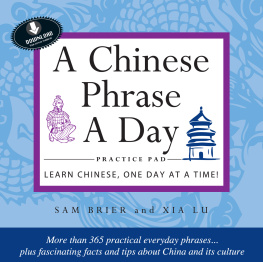

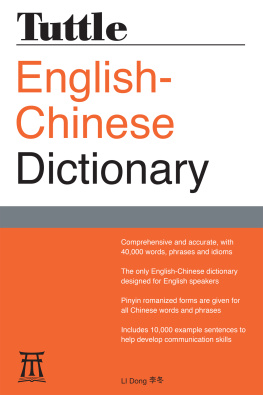
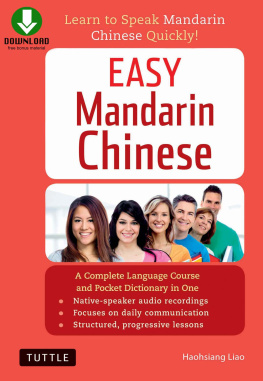
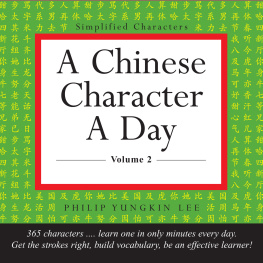
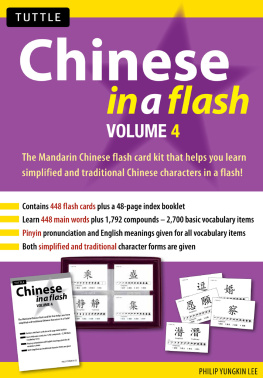
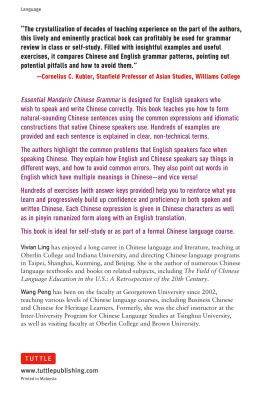
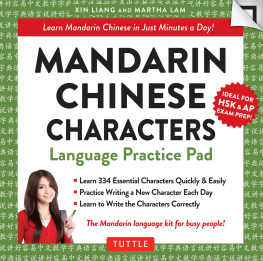
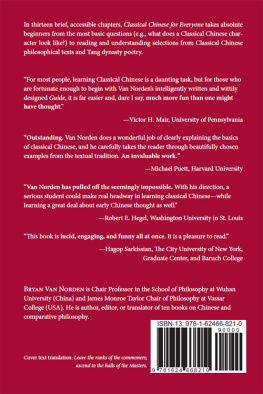
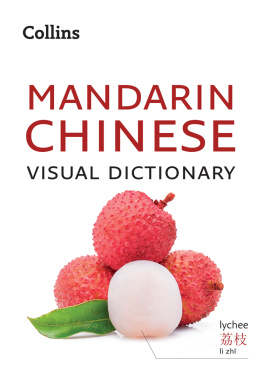
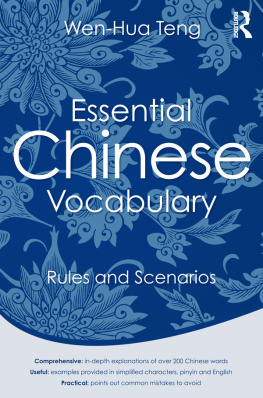
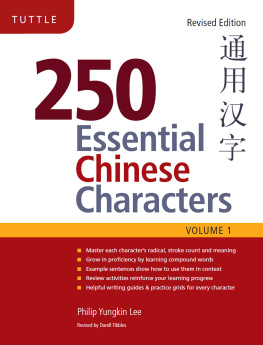

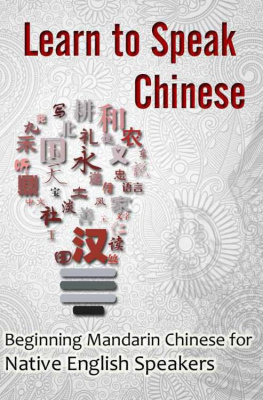

 Audio files for all of the Chinese Phrase A Day entries are available online. Listening and repeating after the native speakers will help you to polish your Chinese. Visit www.tuttlepublishing.com for the audio files.
Audio files for all of the Chinese Phrase A Day entries are available online. Listening and repeating after the native speakers will help you to polish your Chinese. Visit www.tuttlepublishing.com for the audio files. ! Xnnin kuil! Happy New Year! CULTURAL NOTE In order to read a newspaper, a person needs to know about 5,000 Chinese characters; 3,000 will do for functional literacythat is, to be able to read signs, buy food and the like. ? N ho ma? How are you? ? Hn ho. ? N ho ma? How are you? ? Hn ho.
! Xnnin kuil! Happy New Year! CULTURAL NOTE In order to read a newspaper, a person needs to know about 5,000 Chinese characters; 3,000 will do for functional literacythat is, to be able to read signs, buy food and the like. ? N ho ma? How are you? ? Hn ho. ? N ho ma? How are you? ? Hn ho.